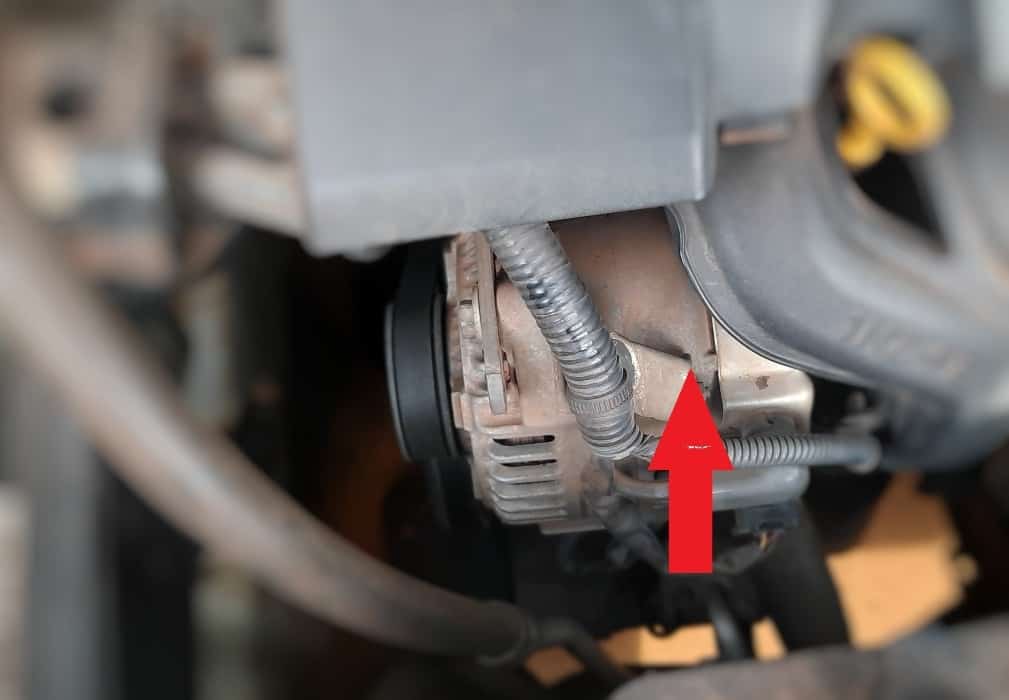Sometimes it is not easy to tell whether you have a bad alternator or a bad battery problem.
After all, one can affect the other, a bad alternator does not charge a battery properly and can damage it.
Also, you need a good battery for the alternator to work.
In this post, you’ll learn how to quickly differentiate between:
- bad alternator and a bad car battery
- the dangers associated with a bad alternator
and how long a bad alternator takes to drain a car battery
Signs of a bad alternator and battery
The table below compares the signs of a bad alternator and battery to help you pinpoint the most likely problem.
| No | Signs that you may have a bad battery | Signs that you may have a bad alternator |
| 1 | Car battery dies when left standing overnight Jumpstarting a car and driving until the battery is fully charged does not help | Your battery appears to be ok but is constantly heating up during charging |
| 2 | Damaged terminal posts or corrosion on the battery terminals | The voltages measured across the battery terminals with the alternator connected is more than 14.5V |
| 3 | Abnormal noises in the alternator |
Next, let’s look at what usually causes an alternator to fail.
4 common causes alternator failure
# 1. Poor alternator to battery connections
Weak ground connection or loose battery cables slow down a battery’s ability to charge.
The alternator ends up running for longer than is necessary which can result in overheating and early failure.
Weak connections can also result in high current from the alternator that causes a damaged battery (with lower internal resistance) can result in high current flows from the alternator, causing overheating and damage to it.
# 2. Disconnecting the battery cables when the engine is running
# 3. Reversing the polarity of the positive and negative cable connection to the alternator
# 4. Poor airflow around the alternator can also damage it
Related Questions
How long a weak (bad) alternator lasts?
How long a bad alternator lasts depends on how severe the associated problem is.
For example, tightening the belt or replacing it may restore the performance of an alternator that has been charging a car battery intermittently.
On the other hand, an alternator that is not charging the batteries fully, or even draining the batteries should be replaced right away.
What are the dangers of driving with a bad alternator?
Keeping a malfunctioning alternator has the following risks:
- In the event that the engine is switched off, your car may fail to start. Your battery may not be charged fully or not charge at all. All electronics or engine starts will draw from the battery reserve until it is drained.
- A damaged alternator can also overcharge and cause permanent damage to the battery
Will a new battery work if the alternator is bad?
A new battery that is fully charged can work, i.e. – supply electricity to your car’s electronics and even start the car provided it still holds sufficient charge. However, a bad alternator may:
- not be able to charge the battery fully
- drain it
- overcharge it
All of which can cause damage to the battery. So while it may work in the short term, a bad alternator needs to be replaced right away to prevent damage to the battery.
Will a new alternator improve performance?
Yes, a new alternator can improve a car’s charging performance if the old alternator was damaged and was not able to fully
charge the battery or was draining the charge.
You can expect better and more reliable battery health of the car battery with a new alternator. Just make sure it is the recommended type for your vehicle model.
How long it takes a bad alternator to drain a battery?
How long a battery lasts when connected to an alternator that drains it depends on the battery capacity and the resistance created as a result of the fault in the alternator.
A bad alternator may have shorted diodes or stator windings, or leaking diodes that drain the car battery in a matter of hours.
The lower the resistance, the faster the battery will drain.
All in all, the most probable signs of a bad alternator are overcharging of the battery, charging voltages over 14.5V, and abnormal noises in the alternator. A bad battery on the other hand may show physical signs of damage or not hold a charge even when fully charged.
Related Topics
4 reasons why your car battery may be dying
How to check if your car’s alternator is working
